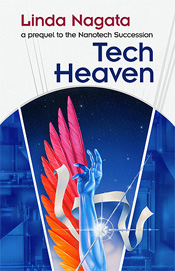Snippet: Tech-Heaven
Saturday, December 8th, 2012 Tech-Heaven is a near-future political thriller that imagines the rise of nanotechnology in our world through the eyes of Katie Kishida, a mother and business woman whose life takes an extraordinary turn when she is widowed, and her husband’s body is cryonically frozen against a time when advancing technology will allow his resurrection.
Tech-Heaven is a near-future political thriller that imagines the rise of nanotechnology in our world through the eyes of Katie Kishida, a mother and business woman whose life takes an extraordinary turn when she is widowed, and her husband’s body is cryonically frozen against a time when advancing technology will allow his resurrection.
* * *
Katie Kishida rode into the little Andean village of La Cruz on the back of a bony black steel mannequin. Through her VR suit she directed each crunching step along the mineral soil of the village’s lone street. A freezing wind whistled through the mannequin’s external joints and soughed past the rim of her VR helmet. She clung to the mannequin’s back, studying the helmet’s video display, anxiously searching the village for signs of life. But there was nothing—not a wisp of smoke or a scrounging bird, or even a cat slinking through the cluster of worn, wood frame buildings.
She commanded the remotely controlled unit to stop. The village made a neat frame for an imposing line of white peaks supporting a heavy ceiling of storm clouds. Bass thunder rumbled there, arriving almost below the range of hearing, a deep vibration that set Katie’s slight, sixty-four-year-old body trembling, and snapped the brittle tethers she’d placed upon her fear.
The Voice cops had forgotten her.
She didn’t want to believe it. Certainly in Panama they’d tried to stop her. Failing that, they’d seized her holding company, Kishida Hunt. They’d confiscated her assets, declared her a criminal, and then . . . nothing. She’d journeyed south for weeks with no sign of pursuit, and that worried her most of all, because the Voice cops wouldn’t give up unless they thought she was dead . . . or disarmed. Maybe they knew about her bootleg copy of the Cure. Maybe they’d seized it before it could be shipped to La Cruz. Or maybe the life-extension schedule was a fraud, and there had been no pursuit since Panama because there was no Cure—and no way to restore life to the cryonic suspension patients hidden in a clandestine mausoleum in the mountains above La Cruz.
Fear had become her default emotion.
She shut down the remote, then slid from her perch on its back to stand on her own stiff legs. Her lean muscles ached and her ass was forever sore. She lifted the video helmet off her head. The wind streamed past her cheeks, its bitter touch oddly familiar. She thought she could feel Tom’s presence in the mountains’ unremitting cold. Tom had been dead thirty years. Or maybe he’d just become a crystalline life-form when his heart had stopped, his body and their marriage both immersed in liquid nitrogen, –196 C, a cold that had haunted her life.
A child’s laughter broke her reverie. Katie looked up. Motion drew her gaze up the street to a single story building slightly larger than all the others, with a hand lettered sign by the door declaring Provisiones. Katie remembered. This was the same store where she’d bought a cup of hot coffee fifteen years ago. Back then, the building had been painted a shade of blue that matched the sky. But time had bleached and chipped away the paint until now there was only a hint of color left between the cracks. The walls were further abused with rusty staples, a few still clenching the tattered corners of handbills that had long since blown away. A little girl was peering past the partly opened door, bouncing up and down in excitement as she exclaimed in lilting Spanish over the skeletal aspect of the remote.
In her eagerness, Katie dropped the helmet in the street, forgetting it before it hit the ground. She hobbled toward the battered building, fighting muscle cramps in her legs. If the Cure had been successfully shipped from Vancouver, then it would be here, in the village store. She could claim her package and push on, higher still into the mountains, to the hidden mausoleum where Tom waited. If she could get to that quiet place, with the Cure in hand and no cops on her trail, then perhaps she could finally confront the ghost that had haunted her for thirty years.








 Powerful women populate my novel, Tech-Heaven, in a story that explores the impact of cryonics, the slow development of nanotechnology, and political issues surrounding both.
Powerful women populate my novel, Tech-Heaven, in a story that explores the impact of cryonics, the slow development of nanotechnology, and political issues surrounding both.